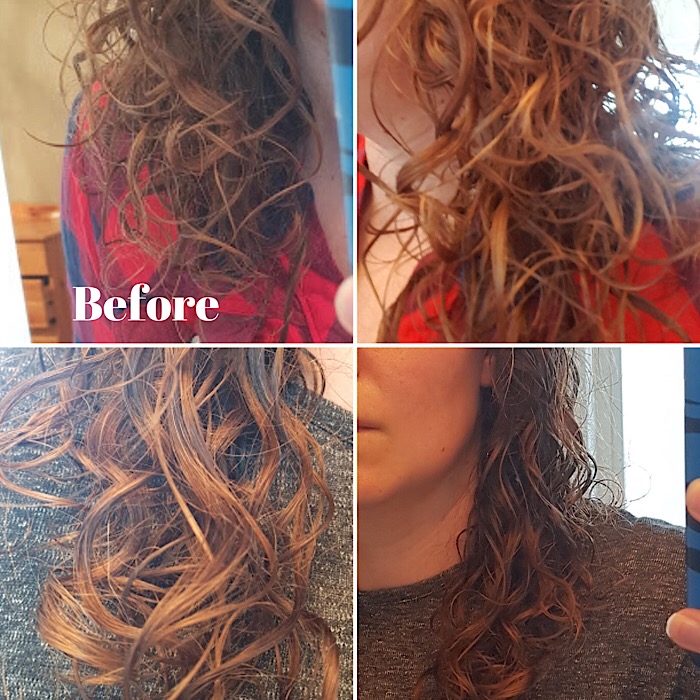Have you ever been on vacation and gotten completely different results from your usual curly routine? It’s not until this happens that we realize the impact the water we use at home has on our hair. We put all of this effort into finding the right products to keep our curls bouncy and healthy, but our water may be working against us!
If you live in a hard water area, you’ve probably had to deal with limescale on your pipes or calcium build-up in your kettle. These mineral deposits can happen on hair too, resulting in dull, lifeless, brittle strands. It can even stop the moisturizing ingredients in your conditioner or deep treatment from being able to penetrate your hair.
If you’re battling with hard water, dry air, and extreme cold this winter, one thing you can at least attempt to improve is your water’s impact on your hair and skin.
What is hard water?
“Hard” or “soft” water refers to mineral content. Rain is soft when it falls from the sky, but if it passes over rocks like limestone or chalk, the minerals from these rocks dissolve into the water. This means hard water has a high mineral content, often including minerals like iron, calcium, and copper. The hardness level of the water in your area will be dependent on where your water comes from. All well water is considered hard, but local reservoir water could be hard water too. A quick Google search of “water hardness + (your area”>” should let you know what kind of water you’re dealing with.
There are two things you can do to combat your hard water: use products that will help reduce the water’s impact on your hair, or purchase a water softener.
Chelating Shampoos
Chelating shampoos and clarifying shampoos are not the same thing, though the words seem to be used interchangeably. Clarifying shampoos are designed to remove product residue. Chelating shampoos are specially formulated to deal with hard metals and minerals and the type of build-up caused by hard water. Some shampoos have the ingredients to be both clarifying and chelating.
Chelating products contain Disodium EDTA (ethylenediaminetetraacetic acid”> and are harsher on your hair than a clarifying shampoo. It is important to ensure you are only using a chelating shampoo when you really need it, and that the rest of your routine helps balance the dryness a chelating shampoo may cause. My favourite deep conditioner to help restore moisture to my hair is the As I Am Hydration Elation, which is Curly Girl Method approved.
Chelating shampoos recommended for hard water build up:
- Ouidad Water Works Clarifying Shampoo
- Malibu C Hard Water Wellness Shampoo (Curly Girl Method approved”>
Ion Hard Water Shampoo (Curly Girl Method approved”>
Apple Cider Vinegar Rinses
Vinegar has been shown to break down minerals like magnesium and calcium often found in hard water, allowing them to be rinsed off of your hair.
Mix one tablespoon of apple cider vinegar into two cups of filtered water to create your own DIY rinse. Pour this solution over your hair after shampooing and massage gently into your scalp. After a few minutes, rinse the apple cider vinegar out of your hair. Repeat up to once per week to keep hair free of mineral build up. If you’re concerned about your hair smelling like vinegar, you can follow it with a bit of leave-in or rinse-out conditioner.
Alternatively, you can purchase products that contain apple cider vinegar, such as:
- dpHUE Apple Cider Vinegar Rinse
- Crème of Nature Apple Cider Vinegar Clarifying Rinse (Curly Girl Method approved”>
- Philip Adam ACV Shampoo (Curly Girl Method approved”>
- AG Hair Natural Balance Apple Cider Vinegar Sulfate-Free Shampoo (Curly Girl Method approved”>
- Hask Organic Apple Cider Vinegar Buildup Removing Rinse
- Txtr by Cantu Apple Cider Vinegar + Tea Tree Soothing Shampoo (Curly Girl Method approved”></li
Several of these products also contain Disodium EDTA – the ingredient used in chelating shampoos to break down mineral build up – as an ingredient.
Water Softeners
Water softeners are a common solution to hard water. There are two types: one that softens all of the water in your house as it enters, usually by adding salt, and smaller ones that attach to or replace your existing shower head or tap.
I recently purchased a Brondell VivaSpring filtered shower head. It claims to remove hard metals and chlorine from water. The filters inside the shower head have to be replaced every six months.

My results from using a shower filter aren’t that easy to see in photos, but I can feel a significant difference. I always thought having coarse, rough hair was just part of being curly. My hair is softer and shinier than it has ever been even after a short amount of time.
Another result from showering with softer water is that my products lather better. I’m able to use less product and it seems easier to distribute too.
One downside I’ve noticed since using this filter is a decrease in hair volume. Much of my volume came from frizz anyway so this isn’t necessarily a bad thing, but it is one of the most obvious changes.
Same products used in both photos: SheaMoisture Curl Enhancing Smoothie and Kinky Curly Curling Custard. My hair looks smoother and more moisturized but looks less voluminous.
Final Thoughts
If you’re finding the products you used to love are no longer doing it for you or your hair is feeling dry and lifeless, check your water! For products to work on our hair, we need to provide them with a healthy base to work with. If your water is drying out your hair or leaving mineral build-up on your curls, try a chelating shampoo, apple cider vinegar rinse, or a water softener. I think you’ll be pleasantly surprised by the results!
